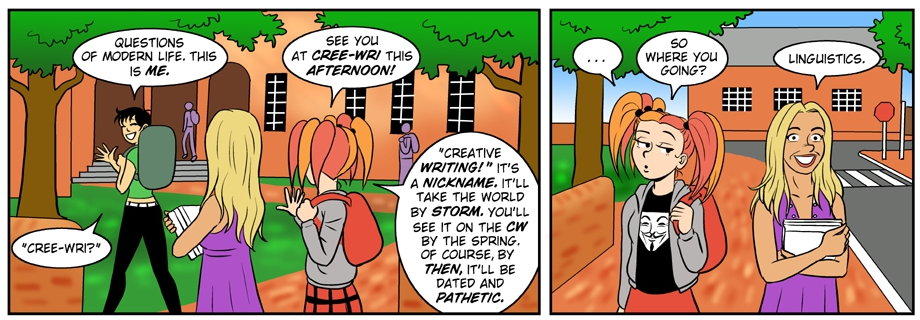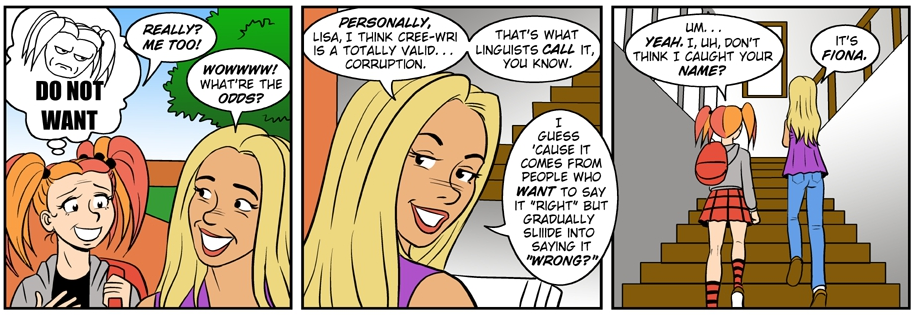'That's what linguists call it"
« previous post | next post »
In the most recent Penny & Aggie, needing an apparently random choice of college class to play a role in an undergraduate interaction, the author chose "Linguistics":
This presupposes that linguistics courses are a normal part of the college landscape, which would certainly be a step forward.
And interestingly, it's the cheerleader type, Fiona, who seems enthusiastic, while Lisa (the kid with multicolored hair and a Guy Fawkes mask t-shirt) is not:
And we even have some (apparently telegraphed) fake linguistics terminology, "corruption" for the abbreviation of "creative writing" as "cree-wri". Clipping of single-word course names(bio, econ, psych, chem) as well as two-word names (soc rel, comp sci, poli sci, con law, comp lit) has been common for at least half a century, but I can't imagine that any linguistics course would suggest the word "corruption" for this process.
Anyhow, I'm curious to learn how this will all work out. One possibility is that the content of the linguistics course will really play a role in the on-going drama. A more likely possibility — and in my opinion, a better sign of the times — is that it'll just be local color, part of the background.


Lawrence said,
December 3, 2011 @ 3:13 pm
As a reader of the comic, I feel it's worth pointing out that Lisa is probably perfectly happy about taking Linguistics — it's Fiona she's not excited about.
Sam said,
December 3, 2011 @ 3:32 pm
Fiona's not entirely wrong — it was a common term in philology, usually in the sense of a manuscript being a faulty copy. It was also sometimes used a somewhat more broadly (though I doubt if it was ever used this broadly) to signify linguistic change, especially in borrowings, as in "the affix ty […] is a corruption of the Latin affix tas, tat" (London Encyclopaedia, 1839).
Can't imagine it's a word that would ever be used in polite linguistic company these days, however.
[(myl) In fact, there are 953 instances of the phrase "corruption of" in OED etymological discussions. But this philological or lexicographic use of "corruption" isn't consistent, in my opinion, with a case in which everyone involved in the process knows perfectly well that e.g. "cree wri" is a clipped form of "creative writing", or that "poli sci" is a clipped form of "political science".
In any event, the OED's gloss for the relevant sense of corruption is "Change of language, a text, word, etc. from its correct or original condition to one of incorrectness, deterioration, etc.", which is not how linguists look at language change in general these days.]
Glen Gordon said,
December 3, 2011 @ 4:58 pm
I've always taken "corruption" to mean, in the purely academic sense, something that is altered (without any negative connotations). No sane person holds such a literal view that language change is "corrupt" in the colloquial usage kind of way anyway. If one hates language change that much, it begs the question why they'd enter linguistics in the first place.
Ken Brown said,
December 3, 2011 @ 5:17 pm
Surely the joke is that Linguistics is not normal? Unexpected in the Landscape?
Though both the universities I've studied and worked at do in fact have undergraduate linguistics courses so for me it is a normal part of the landscape.
Ken Brown said,
December 3, 2011 @ 5:18 pm
Crystallography and pollen analyisis, on the other hand…
Alacritas said,
December 3, 2011 @ 6:22 pm
What's with all the boldface type? Is it supposed to indicate sentence stress? I mean, I would never stress a sentence like that. It seems pretty absurd to me.
On an unrelated note, did anyone else notice the rising intonation in their speech? I didn't know that was, like, kosher to write now?
Will said,
December 3, 2011 @ 8:57 pm
@Alacritas, I was also going to comment asking about the bold/italics everywhere. Some of them do seem to correspond to spoken emphasis, but some of them do not, and only serve to distract me from the dialog. Couldn't figure it out.
Maybe I'm just unfamiliar with comics; it also took me a while to figure out who was saying what, when, and to whom in the first panel.
Shane said,
December 3, 2011 @ 9:12 pm
Linguistics is the one course I took at UCI that I remember, that has stuck with me and has been infinitely valuable in many many areas of life. No exaggeration.
Dan Lufkin said,
December 3, 2011 @ 9:44 pm
Notice that Fiona says "Wowww!" and "sliiide"? Vowel length as well as stress emphasis.
Phil Dilts said,
December 3, 2011 @ 10:42 pm
I e-mailed T Campbell, one of the comic's creators, about this. It turns out he _does_ know what he's talking about – it's Fiona that's got the wrong idea about linguistics, not the person who chose what she said. I'm looking forward to seeing this come out as the story develops!
[(myl) Yes, I figured that the "…" in Fiona's performance was telegraphing the idea that she was faking it a bit. And I'm also looking forward to seeing how the story develops!]
Henning Makholm said,
December 3, 2011 @ 11:44 pm
Huh. I freely admit that I know nothing about American youth culture except what seeps randomly in through the internet — but if somebody had put a gun to my head and asked which of the characters in those pictures is a "cheerleader type", I'd have bet my life on the pigtailed one in the miniskirt …
[(myl) We're talking about stereotypes rather than reality here, but earlier in the comic (as you can see from the cast page), Lisa is a pictured as belonging to a counter-cultural type that is stereotypically not involved in activities like cheerleading at the high-school level. The residue of that identity in this strip includes the multi-colored hair and the t-shirt design.
I should say that the cheerleaders I've known at the college (as advisees and students) have been a very diverse and interesting bunch, with plenty of intellectual as well as physical talents, who didn't really conform to the stereotype very well at all. So in fact i should not have used this short-hand method for describing the ways in which Fiona's self-presentation is the opposite of Lisa's.]
maidhc said,
December 4, 2011 @ 1:22 am
There's an old-style school of comics lettering that says that a block of text is more legible if some words are bold, because it sets off the word boundaries better. It's not supposed to correspond to emphasis. It compensates for the caption being all capitals.
A quick sampling of newspaper strips from the 1950s shows about 1/3 of the strips using this technique. But in action comic books it's almost universal.
There are only a few strips where bolding appears to be totally driven by layout and is unrelated to the meaning of the dialog. In most cases it could be plausible as stressed words, but it's not really natural, e.g., I SUSPECTED THAT YOU WOULD SOON ARRIVE! That appears to be what's going on here.
In today's newspaper comics I see this technique in Dick Tracy, Get Fuzzy (both bold and italics), Ginger Meggs (also italics), The Knight Life, Mary Worth, The Phantom, The Amazing Spiderman, Tina's Groove, Tom the Dancing Bug and Zippy. That's a smaller percentage of the total than my 1950s samples, but it shows that the concept is still being used.
George Herrimann in Krazy Kat made considerable use of quotation marks, e.g., IS THAT A "BRICK", "MOUSE"? However, the strip was so quirky it's hard to draw any conclusion from that.
tk said,
December 4, 2011 @ 8:36 am
I woulda thunk that such 'corruptions' as "soc rel, comp sci, poli sci, con law, comp lit", etc., derive from course catalog abbreviations passing into everyday college-speak. If this were so, shouldn't the mots in question be "cre wri" or "crea-wri" (pronounced "kre-wry") rather than "cree wri"? As it is, it could be a course in the Algonquian syllabary.
tk
Wesakechak Rules!
Eric P Smith said,
December 4, 2011 @ 12:46 pm
Following on tk's comment, I am wondering if “cree” is the written form of an abbreviation for /kɹɪˈeɪtɪv/ or /ˈkɹiːtɪv/. Increasingly I hear the latter from young speakers.
Rodger C said,
December 4, 2011 @ 12:50 pm
It was obviously Wesakechak who inspired the writers of the Indiana U course catalogue in the late 60s to abbreviate Comparative Literature as CLIT. When I returned from the Army this had become CMLT. We went on calling it Comp Lit, of course, as we always had.
Rod Johnson said,
December 4, 2011 @ 1:40 pm
"On an unrelated note, did anyone else notice the rising intonation in their speech? I didn't know that was, like, kosher to write now?"
Kosher? There's no Halakha for English, so to speak. It seems that, if you're trying to capture the way people really speak in dialogue, you use whatever resources you have to hand. Comics are notorious for using eye dialect (like the Fantastic Four's Thing's "wuz," pronounced identically to "was" but somehow signifying his "street" origins) and other techniques for representing parole.
Circe said,
December 4, 2011 @ 3:35 pm
Well, I attended an engineering college in India which did not even offer a major in any Humanity-related field (except Economics) and even there Linguistics courses were reasonably popular among students.
Brett said,
December 4, 2011 @ 8:24 pm
@Rod Johnson: I often wonder how specifically comic writers are envisioning an accent when they write that kind of eye dialect. It's actually particularly puzzling in the case of the Thing, since most of his mannerisms were modeled after those of Jack Kirby, as an inside joke. Kirby did have an interesting accent, but there did not seem to be anything unusual about his pronunciation of "was."
Bruno Estigarribia said,
December 4, 2011 @ 8:50 pm
@Alacritas: Taylor Mali noticed:
http://www.youtube.com/watch?v=pKyIw9fs8T4
[(myl) And created what is probably the most spectacularly self-refuting performance in history — at least in the sense that his delivery refutes his argument. See "This is, like, such total crap?", 5/15/2005. See also "Uptalk anxiety", 9/7/2008, and "Annals of uptalk: the python wrestler", 3/6/2010.
In the Penny & Aggie strip featured in the OP, there's actually only one question-mark that appears to indicate a classic instance of uptalk: "I guess 'cause it comes from people who want to say it 'right" but gradually slide into saying it 'wrong'?"
The other example of a question-mark that not on a syntactically-marked question is "I, uh, don't think I caught your name?", which is a conventional (or at least common) way to ask the question "what is your name?". This sort of thing has been written with a question mark in English-language novels for more than a century.]
Adrianne said,
January 2, 2012 @ 9:41 am
For what it's worth, Harvard (at least Harvard of 10 years ago) had an intro linguistics course (Social Analysis 34, I believe) as part of its basic core curriculum options, taken by undergrads for distribution requirements. Taught by an actual linguistics professor and at a pretty decent level. (Pulled out my textbook the other day to settle a dispute with the husband, actually.)